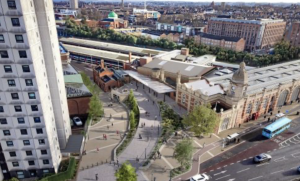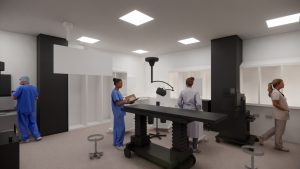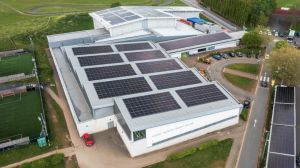Rents drop as East Mids retail vacancies rise

Industrial property is the best peformaer in the East Midlands Commercial market as retail continues to lag significantly, according to the Q4 2017 RICS UK Commercial Property Market Survey.
In the East Midlands retail sector in Q4 2017, occupier demand fell for the third consecutive quarter with 27% more respondents reporting a fall in demand from prospective tenants. Alongside this, the retail sector saw an increase in the availability of leasable space.
Rents across the region are also expected to decline for retail space in the near term, and this picture is predicted to continue over the next 12 months. That said, although rent projections for prime retail space remain flat in Q4, the weakness in retail rental values is mostly in secondary retail locations remain in negative territory.
Across the region, headline occupier demand for commercial property slipped into negative territory in Q4, despite rising industrial demand the continued decline in retail and a fall in office demand underpins the all sector net balance. Some 22% more respondents have seen an increase in occupier demand for industrial space in Q4. As industrial continues to outperform, the near-term rental growth in that sector remains positive with 26% more respondents expecting a rise in rents. Respondents also anticipate slight growth in office sector rents in the East Midlands.
Although the East Midlands office sector fell in Q4, the value of landlord incentive packages has now risen in six straight reports.
Looking further ahead for industrial and office space, over the next twelve months both prime and secondary industrial rents are predicted to rise, while prime office rents are expected to see modest gains and the outlook for secondary offices remains flat.
Moving to the investment side of the market, 20% more respondents cited an increase in enquiries from investors in Q4,. Looking at sectors, investors were most interested in industrial and office, with demand picking up in both, while enquiries flat across retail. Interest from overseas buyers subdued this quarter, at the all sector level, but with growth evenly matched across each market sector. In the face of increased interest, the supply of investable office and industrial units continued to decline in Q4.
Near term capital value gains in the East Midlands are expected to be most significant in the industrial sector with 37% of respondents anticipating a rise, but they also weakened slightly in the office sector relative to Q3. At the twelve month horizon, industrial assets once again exhibit the firmest twelve month outlook, both prime and secondary, compared to all other categories. Projections are comfortably positive in prime office sub markets but display are flat in secondary office sub markets. Once again secondary retail is the only sub-market in which respondents anticipate a fall in values over the year ahead in its entirety.
Moving to perceptions of market value, the majority of contributors (74%) feel the market offers fair value. When asked for their perceptions on the stage of the property cycle 32% of respondents believe the East Midlands commercial market is midst an upturn.
Richard Sutton, of NG Chartered Surveyors in Nottingham, said: “On a local level the position remains unchanged this quarter, demand for prime and secondary industrial is still very strong. Prime offices are continuing to attract strong interest, secondary office stock is falling back in terms of demand and deals.”
Commenting directly on the Daventry market, Brendan Bruder BSc MRICS, of Abbey Ross Chartered Surveyors said: “Whilst Daventry continues to perform as a logistics hot spot, development or activity in other sectors is very constrained. Daventry District Council are identifying sites to address this and are trying to progress the multi-use Mulberry Place development in Daventry’s town centre.”
Garry Wood of Wood Moore & Co in Newark said: “The market is stable but subdued. It appears occupiers are deferring acquisition decisions.”
Simon Rubinsohn, RICS chief economist said: “The weakish tone to the Q4 survey results for the retail sector sits comfortably alongside the generally disappointing trading statements emanating from the high street in the run-up to Christmas. The counterpart to this is the ongoing strength in demand for well-located warehouses to support the inexorable rise of the online consumer.
“Meanwhile in the office sector, the resilience of the headline rent indicator is masking the increasing attractive inducement packages required to encourage take up of space. Valuations particularly in the capital’s office market continue to look stretched but overseas investors remain ready buyers for now even as domestic money seeks out opportunities elsewhere around the country.”









